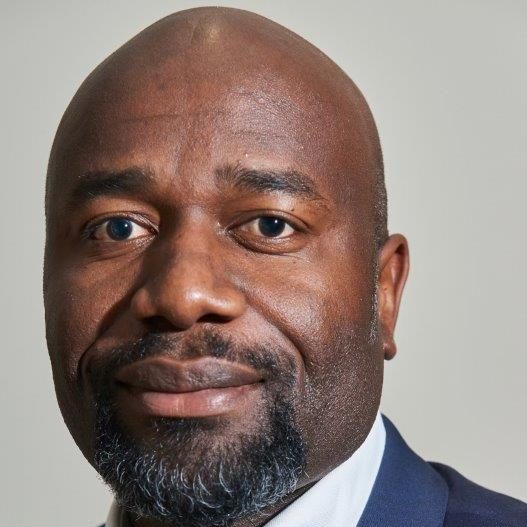After completing his engineering studies at the Mannheim University of Applied Sciences in Germany, Yves Nono devoted his career to technology. With twenty years’ experience at the powerful multinational Bosch, where he is President Automotive Aftermarket, Region Africa, the Cameroonian is at the forefront of sustainable development issues on the continent. The trilingual (French, English, German) graduate of Harvard Business School (HBS) in the USA proudly answers questions from the AFRIK21 editorial team in this exclusive interview on eco-responsible motoring.
Benoit-Ivan Wansi :With sales of $88.2 billion in 2022, Robert Bosch is one of the world’s largest technology groups. How do your digital solutions, particularly artificial intelligence (AI), contribute to the development of the mobility sector, particularly in Africa?
YVES NONO : Bosch is leading the way in mobility technology advancements, investing some 3 billion euros on automotive software expertise with solutions already available in motor vehicles taking to the roads across the globe, enhancing the safety of motorist and passengers on the road. In Africa, Bosch aims to utilize its global expertise to assess the feasibility and commercial viability of advanced mobility technologies. By tailoring these solutions to the African context, Bosch strives to enhance mobility, convenience, and safety for African users, contributing to the region’s development.
In Ghana, Bosch has become a key player in lead-acid battery recycling, established through reverse logistics in partnership with local market professionals, battery distributors, used battery collectors and end consumers. Lead-acid automotive batteries are known to contain heavy metals and toxic chemicals that are harmful to the environment (soil contamination, water pollution) and human health. The UN estimates that 800,000 units of batteries are exchanged each year in Ghana. What’s the status of this eco-responsible project in this West African country?
Our founder, Robert Bosch place Corporate Social Investment (CSI) initiatives as a priority. With a strong commitment to sustainability, Bosch leverages its global position to drive meaningful change and address pressing social and environmental challenges.
In 2020, Bosch established in a strategic partnership with a local player in Ghana. Together, we have initiated a battery recycling project aimed at reducing environmental impact. The local partner serves as the primary collector of batteries, with wholesalers acting as collection points. The project has been successful in Ghana, collecting a significant number of used batteries. Plans are underway to expand the project by adding four new collection points. By working closely with local partners, Bosch aims to leverage its global expertise to develop and implement sustainable initiatives tailored to the African context, positively impacting both the environment and local communities.
What is the nature of your relationship with the Nexus Automotive international group?
Bosch is proud to have a growing partnership with Nexus Automotive International Group, a renowned organization in the automotive aftermarket industry. Within this partnership, Bosch and Nexus foster a collaborative environment where resources and knowledge are shared to shape the automotive aftermarket industry. By pooling our expertise and insights, we aim to drive innovation and set new standards in the automotive aftermarket sector, resulting in significant benefits for industry stakeholders and end-users.
Can you tell us about your target vision “New Dimensions – Sustainability 2025”? How does it differ from “Bosch Climate Solutions”, which you launched in 2020, and how do these initiatives support the aftermarket?
Our target vision “New Dimensions – Sustainability 2025” describes our sustainability strategy. It summarized the focal points of our sustainability management, addressing not only climate action but also resource conservation, circular economy, and social responsibility. By pursuing concrete objectives in the focus areas, we are not only enhancing the sustainability performance of our own operations, but also support automotive aftermarket by promoting sustainable practices and integrating alternative fuel technologies. We have ongoing concrete projects within the aftermarket aimed at reducing carbon emissions and advancing sustainability in the automotive industry.
In your 2020 report, which we consulted, we read that “1 kilogram of green hydrogen is enough for a passenger car to travel around 100 kilometers”. Does this mean that you are committed to energy transition, particularly in the transport sector?
Bosch is dedicated to advancing the energy transition within the automotive sector. The fact that 1 kilogram of green hydrogen can power a passenger car for approximately 100 kilometers aligns perfectly with our commitment to promoting sustainable and efficient mobility solutions. We actively engage in the hydrogen (H2) value chain, developing applications and driving the adoption of this clean energy source within the automotive industry.
Do you think the switch to renewable energies will defuse the energy crisis and benefit green mobility, especially in South Africa?
The energy sector faces various challenges, but it is important to acknowledge that multiple solutions are available. Accelerating the transition to renewable energy sources is crucial in addressing these challenges effectively. Renewable energy not only helps to resolve energy crises but also simultaneously aligns with the objective of reducing carbon emissions and achieving carbon neutrality (net-zero). In certain scenarios, a hybrid solution can be pursued, combining different green energy solutions to meet the energy demands while reducing environmental impact. Africa, with its abundance of renewable energy resources, plays a significant role in advancing these sustainable solutions. It is imperative to fasttrack the implementation of these initiatives, promoting a healthy mix of green energy technologies to create a sustainable and resilient energy future.
Interview by Benoit-Ivan Wansi
